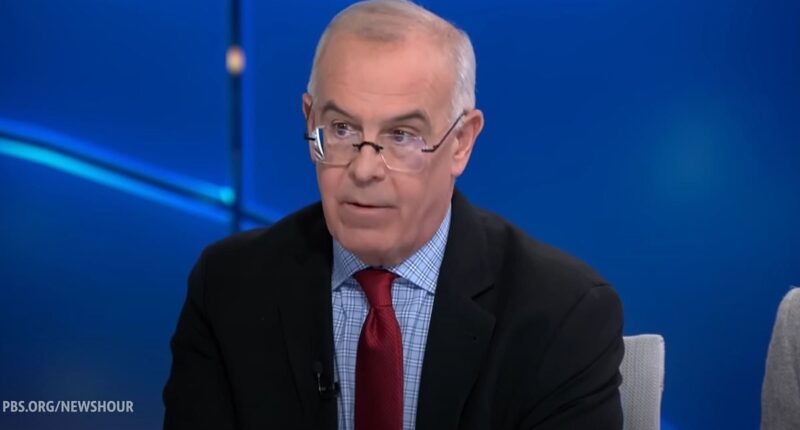Over the weekend, a New York Times columnist critically assessed cable news networks, accusing them of offering content that is excessively politicized.
The columnist, David Brooks, expressed his views during a panel discussion on PBS NewsHour, underscoring the declining ratings of progressive networks as an indication of the need for a change in American perspectives.
Brooks, a 63-year-old journalist originally from Canada, shared his excitement about the trend, suggesting that the decreasing viewership could be attributed to viewers growing weary of the excessive political content on these channels.
The assertion was aired after host Lisa Desjardins pointed out the program had found that the political word of the year had been ‘exhaustion’ – after asking viewers and readers for a specific term.
The rest of Brooks’ spiel appeared to take aim at identity politics – something that’s become increasingly prevalent on networks like CNN and MSNBC over the decades.
This continued after the election, paving the way for an even more pronounced post-election dip that raised ratings alarms.
Compounding the cable news crisis is streaming, which more and more Americans are adopting by the year.
The trend has affected former juggernauts CNN and MSNBC the most, with both facing double-digit declines since November 6. Tasked with explaining why it became even more pronounced in the wake of the election, Brooks did not mince any words.
Scroll down for video:

New York Times columnist David Brooks embarked on a devastating takedown of cable news networks on Friday night – for what he painted as ‘over-politicized’ content

The comments came in during a panel discussion with PBS NewsHour, after host Lisa Desjardins pointed out the program had found that the political word of the year had been ‘exhaustion’ – after asking viewers and readers for a specific term
‘I have to say, I’m thrilled by the decline in viewership for political news,’ the pundit, who bills himself as a moderate, began.
‘We’re over-politicized in this country. People go to politics for a sense of belonging, for a sense of righteousness. You should go to your friends for those things.
‘You’re asking more of politics than politics can bear,’ he added – after weeks of figures like Rachel Maddow and Joy Reid waxing poetic about the state of their party in repeated attempts to make sense of Kamala Harris’s resounding loss.
‘My word for the year is chastened,’ he continued, claiming its humble pie that these progressives and their supporters should be eating.
‘For those of us who oppose Donald Trump, we should be chastened because of the plurality of the American people thought we were wrong,’ he went on, in what amounted to a surprising critique of the mainstream media by a longtime member.
‘If you’re a worshiper of the European social welfare model, you should be chastened, because that’s falling apart.’
He went on to praise Israel’s Benjamin Netanyahu for ‘taking down Hamas and Hezbollah and Assad’, telling those watching ‘If you hated Bibi Netanyahu, you should be a little chastened.’
Brooks concluded by saying, ‘So there’s a lot of reason for humility at the end of this year.’

Joined by Jonathan Capehart, an associate editor for the Washington Post, Brooks did not mince words when he suggested the American public was fed up with opinions in lieu of news
Jonathan Capehart, an associate editor for the Washington Post, was posed the same question, during a talk centered around tensions brewing within Donald Trump’s camp over immigration policy, and Joe Biden’s recent slew of pardons and commutations.
Seemingly still reeling from Brooks rundown, the journalist at the Jeff Bezos-owned newspaper simply said: ‘I have no word because there are too many… So I will just leave it at that.’
Meanwhile, viewership for cable news networks in general is down.
The Wall Street Journal reported on Sunday that CNN’s viewership was down 46 percent since the election, when it had 5.1 million viewers – a number that dropped to 419,000 the following Thursday.
Moreover, from the day after the election through last week, MSNBC has averaged only 603,000 total viewers in primetime.
That’s less than half of its year-to-date average – with its total primetime audience falling 55 percent from November 4 through December 15, according to Nielsen numbers released this month.
The reasons for the drop are being widely debated, but many have laid blame on viewers being deterred by the outcome of the election.
Worsening matters are stars like Reid failing to read the writing on the wall, with the ReidOut star last month shaming Latino men for voting for the president-elect on the air.


figures like Rachel Maddow and Joy Reid, meanwhile, continue to wax poetic about the state of their party following the election loss – instead of looking inward when it comes to explaining the result
‘While 91 percent of black women voted for [Harris], 53 percent of white women overall voted for Trump,’ she said framing racism as the driving force behind Trump’s win
‘[This is] despite the open disrespect and demonization hurled by JD Vance and the Supreme Court stripping women’s bodily autonomy, courtesy of Donald Trump.
‘Also, Latino men, who – despite the utter disrespect shown by Trump and his promise to deport some of your mixed-class, mixed-status families – most of them voted in a 55 percent majority to make the deportations happen,’ she continued, mentioning planned policies.
Going on to speak to Latino men who voted Trump directly, she went on to say: ‘You [better] own everything that happens to your mixed-status families and to your wives, sisters and abuelas from here on in.’
MSNBC is now reportedly slashing he pay, after already reducing Maddow’s pay by some $5million after she agreed to stay with the network for another five years, both Status and The Ankler reported.
The new boss of the media firm that oversees MSNBC, SpinCo CEO Mark Lazarus, has also reportedly expressed a desire for Republican voices on the left-leaning network.
Moreover, CNN is reportedly on the verge of massive layoffs, following a slew of high-profile exits.
As it stands, prime time is currently made up of predominantly progressive opinion programming from both networks
Right-leaning hosts like Laura Ingraham, Jesse Watters, Sean Hannity, and Greg Gutfeld, meanwhile, are averaging 2.8million in the same timeslots.
















